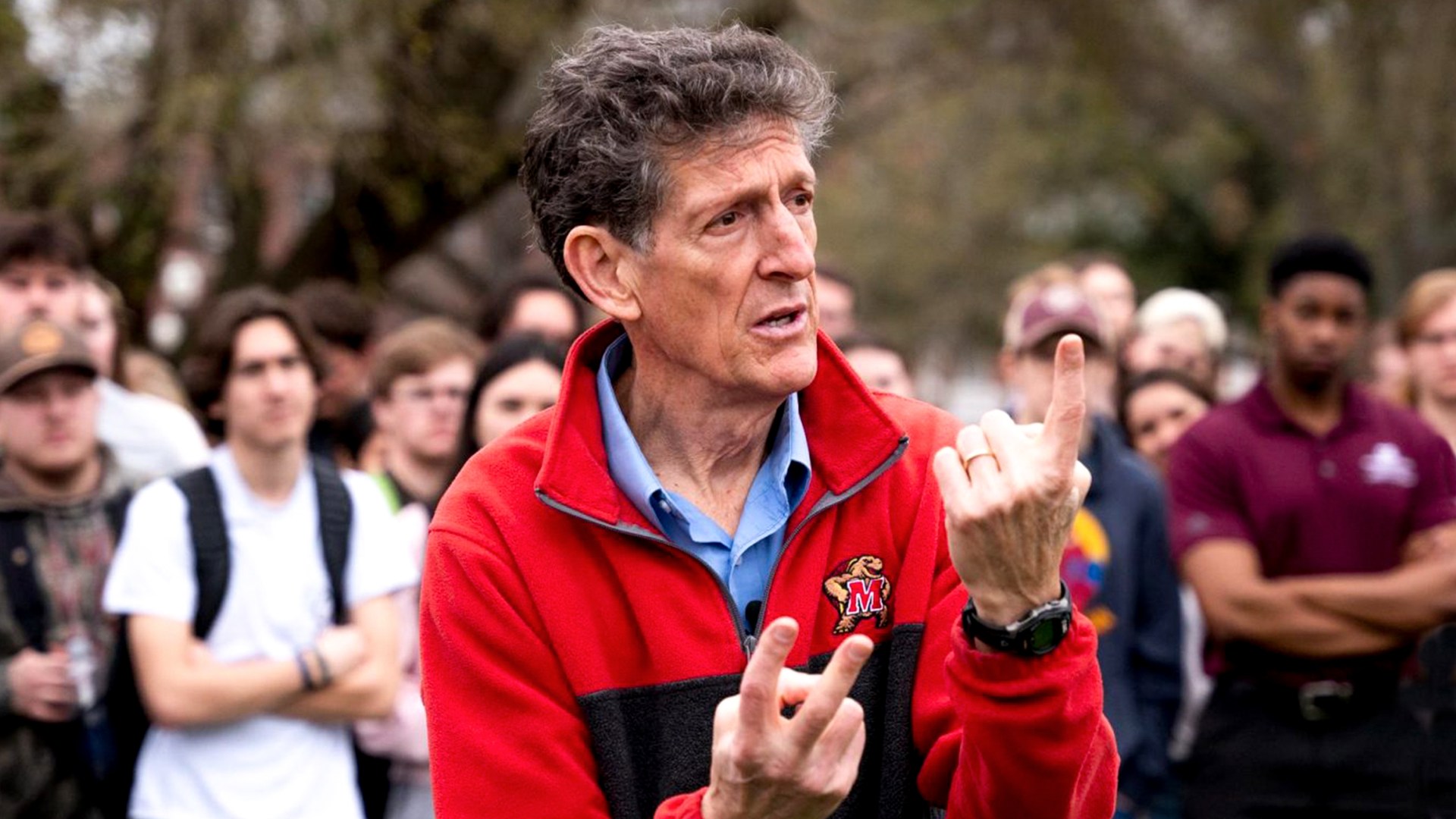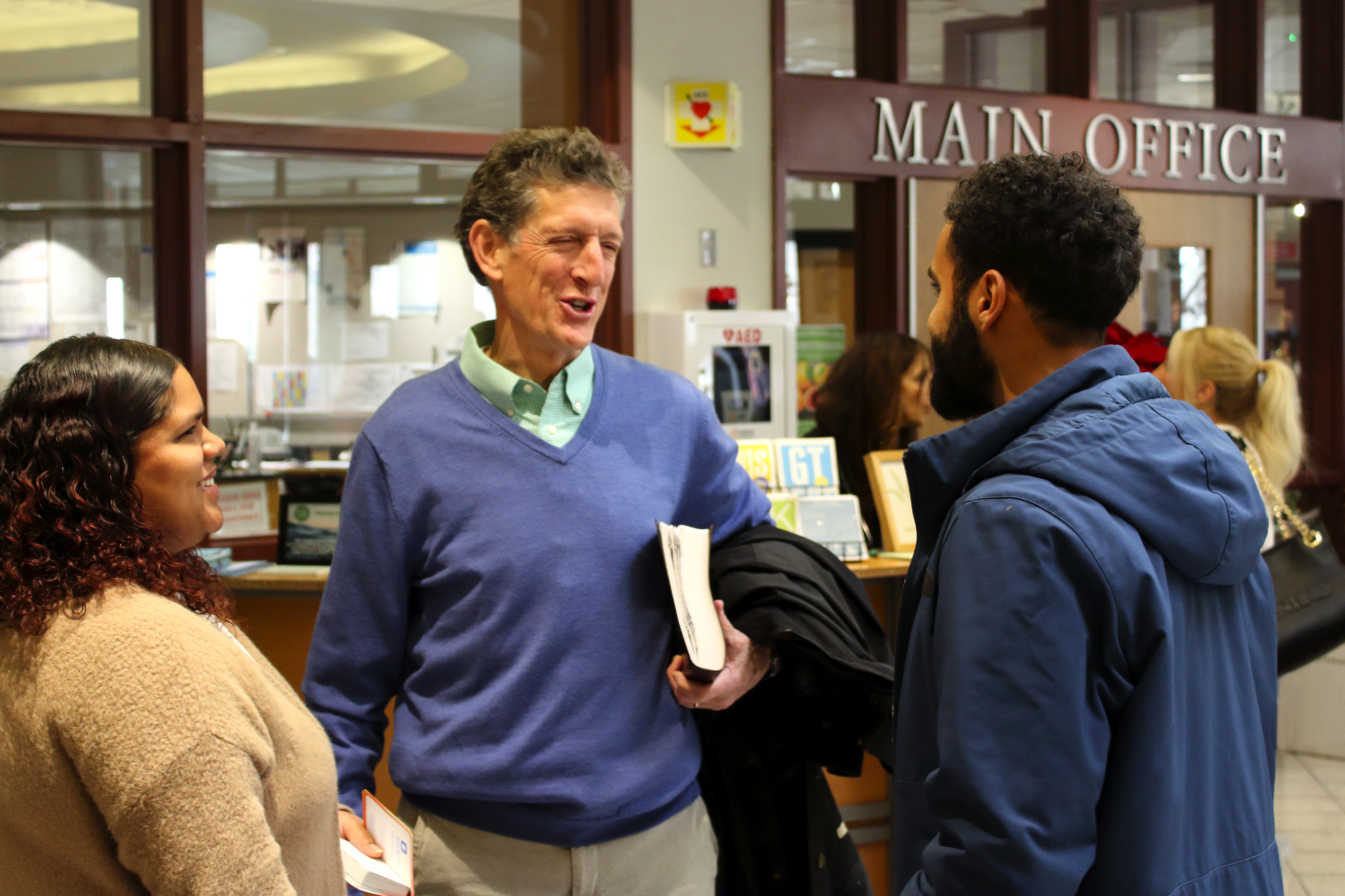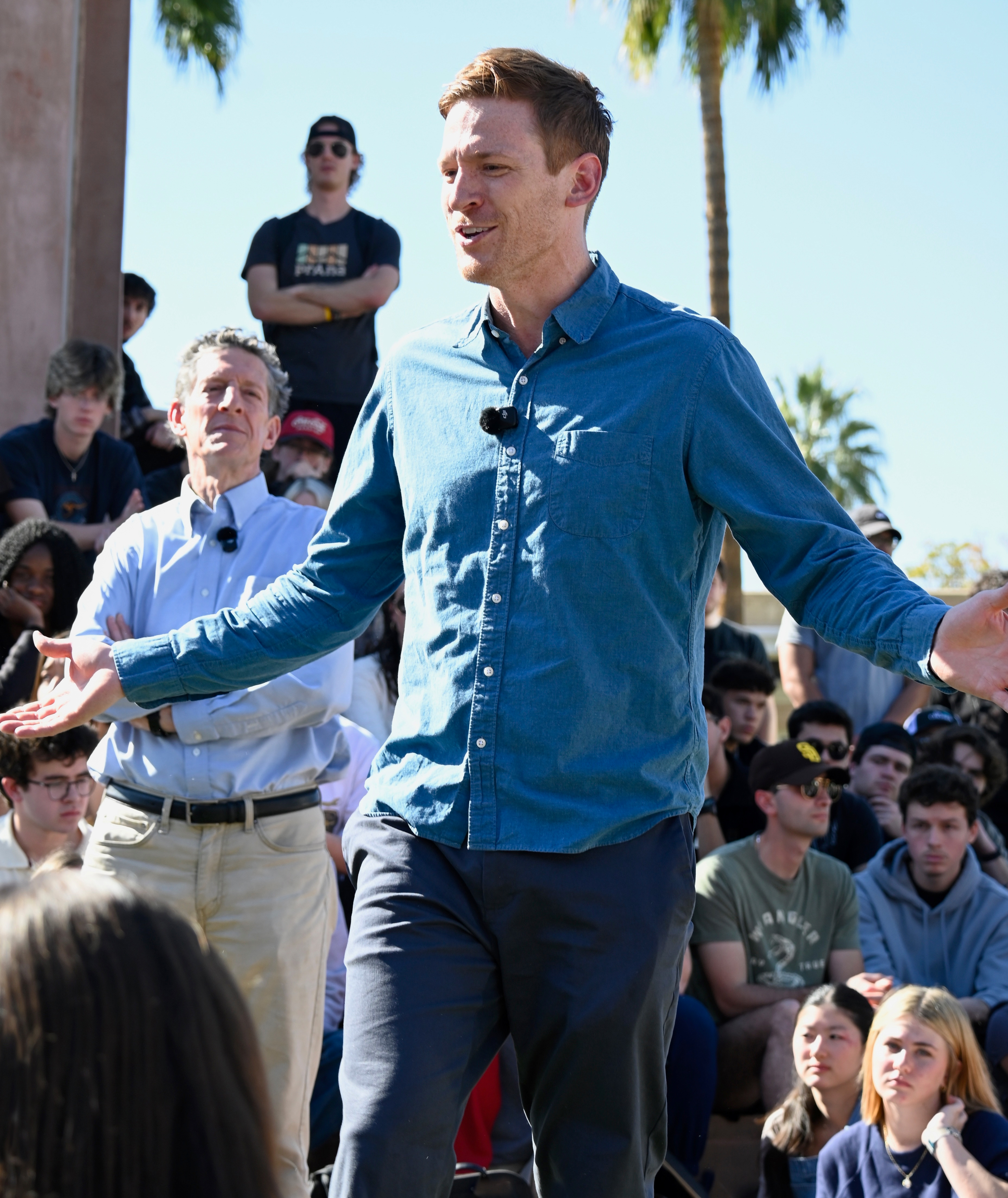At Grace Community Church in New Canaan, Connecticut, friendly greeters chat with the regulars and newcomers who stream through the doors of the local high school where they meet.
A huddle of visitors also surrounds the senior pastor, listening to him hold court as he puts on his lapel microphone minutes before the service begins in the adjoining auditorium. This group drove over an hour, from the United States Military Academy in West Point, New York, to meet him.
Cliffe Knechtle, the 71-year-old pastor of a typical nondenominational congregation, also has a celebrity-level internet presence. He preaches to hundreds on Sundays, and millions have watched clips on TikTok, Instagram, and YouTube of the open-air campus dialogues that have defined his four decades of ministry.
These social media videos show Knechtle debating hostile challengers or calmly coaching a seeker through a nagging doubt about the Christian faith.
“We’ve seen his videos, but I think the biggest thing for us was just to actually see him in person,” said Markel Johnson, one of the visiting cadets. “We were actually talking to him about coming, possibly, to West Point.”
Visitors like Johnson regularly show up at Grace, coming from as far away as Australia. But while Knechtle draws scores of TikTok pilgrims to New Canaan, he reaches exponentially more people on the internet.
Before his rather sudden takeoff on viral video platforms, Knechtle persevered through a long, relatively obscure slog from one college campus to the next, often with his wife, Sharon, and their three boys in tow. Though much has changed, he insists that one thing has not: Faithfulness, not virality, is the measure of a ministry’s and a minister’s success.
At 26, Knechtle was frustrated.
He had joined InterVarsity Christian Fellowship as a staff evangelist soon after graduating from Gordon-Conwell Theological Seminary in Massachusetts in 1979. With the goal of reaching skeptical students, he took trips to colleges, where he would visit dormitories to speak.
Skeptics rarely showed up, though. It was mostly Christians who wanted to engage. Knechtle wasn’t sure how to change that, but Leighton Ford had an idea.
A prolific and prestigious evangelist, Ford, 93, has been many things to many people. To Billy Graham, he was a mentee, ministry partner, and brother-in-law. To attendees at mass evangelism events around the world, he was a stirring preacher. And to Knechtle’s father, Emilio, he was a friend.
Several years earlier, Emilio Knechtle had brought his son to meet Ford and his wife at their home in Charlotte, North Carolina. The Knechtles were visiting nearby Davidson College, where Cliffe would soon enroll. After he moved to campus, the Fords invited him for another visit. Before long, he was spending most weekends in their home.
Ford became a spiritual father and mentor to Cliffe, so his words to the disheartened young minister held great weight. They were sitting together in Cliffe’s parents’ living room when Ford made a suggestion that would change Knechtle’s life.
 Photo Courtesy of Ericksen Gomez-Villeda / The Daily Beacon
Photo Courtesy of Ericksen Gomez-Villeda / The Daily BeaconFord recounted that on a recent visit to the University of Arizona, he had noticed an open-air preacher delivering a “hellfire and brimstone” message. Students had quickly gathered around. What if Cliffe tried something similar but instead of condemning the listeners to hell, he presented “both the love and the truth of Christ”?
Knechtle remembers his gut reaction: “It’s a crazy idea, but because it’s Leighton Ford telling me, I think I’ll try it.”
He traveled to Fort Lauderdale, Florida, during spring break as part of a project with InterVarsity and started preaching on a crowded beach. Young vacationers hopped off their towels to listen.
“I jettisoned my outline and began to answer their questions, and that’s how we began the dialogue” Knechtle recalled.
InterVarsity began sending Knechtle to colleges all over the country to hold open-air dialogues. Each visit lasted about a week, and the InterVarsity chapter or another Christian organization on campus cleared the gatherings with school officials.
Knechtle opened each session with a short introduction and then invited onlookers to ask questions. A Christianity Today article from 1981 records that he visited over 30 campuses in the first year of this new ministry, a pace he would maintain for the next decade.
Those early years were exciting and challenging. Knechtle spoke to plenty of doubting and agnostic young people, many of whom were eager to stump him. Sometimes they did. When that happened, Knechtle began saying (with a slight pause after each word, ticking them off on his fingers for emphasis) what would become a catchphrase: “I. Do. Not. Know.”
“I had to give that answer a lot more often when I started open air than I do today,” Knechtle said. “But I still think even today, it’s one of the best answers I give.”
Knechtle said “I do not know” so often that he says the phrase became his eldest son Robert’s first words. This honesty and vulnerability differentiated Knechtle from the sort of preacher most students expected. Knechtle still drew plenty of hecklers, but many non-Christians appreciated his approach.
Paul Tokunaga saw this dynamic firsthand while a campus minister at Florida State University in the early ’80s. Students there were accustomed to seeing outdoor preachers “shouting and often berating people,” Tokunaga said. The InterVarsity chapter invited Knechtle, hoping he would engage with students constructively while still capturing their attention.
Students would say, “Hmm, this guy’s a little different,” Tokunaga recalled. “He’s not calling us names, he’s listening to us, and some of what he says makes sense. I think I’ll stick around and see what he’s about.”
During his first visit to Florida State, Knechtle asked some InterVarsity students to talk about how they came to faith. The next time, Tokunaga worked up his nerve and volunteered to share his story along with the students. To his surprise, Knechtle instead challenged Tokunaga to join him in preaching and answering questions.
“I just had a heart attack,” Tokunaga remembered. He worried that he didn’t think quickly enough on his feet to give strong answers during a debate, and the thought of engaging with antagonistic hecklers was intimidating. All in all, it sounded like a good opportunity to get embarrassed. Still, Tokunaga decided to try.
Before going before a crowd, Tokunaga preached in his apartment to an audience of one: Knechtle, who offered tips and tried to simulate the environment they would encounter on campus. Later that week, it was time for the real thing.
“So I went out there,” Tokunaga said. “Cliffe was kind of hanging back. … He was kind of my security blanket. And it went okay. People asked questions, and I think I answered most of them. I don’t know if the answers were any good or not, but I did my best.”
Despite his initial reservations, this experience became a springboard for Tokunaga. He continued to speak and served with InterVarsity for over 40 years, including as a vice president.
As the years rolled by, Knechtle continued his itinerant ministry and developed a following. He was invited to speak in connection with a Billy Graham crusade in Chapel Hill, North Carolina, in 1982 and the Urbana student missions conference in 1984.
In 1986, InterVarsity Press published Knechtle’s first book, Give Me an Answer That Satisfies My Heart and My Mind: Answers to Your Toughest Questions About Christianity. Still conscious of negative stereotypes, he wrote in the introduction that he hoped the book would “give some degree of credibility and substance to my ministry since open-air preachers do not have the greatest reputations.”
Almost 40 years later, he’s not sure that the book had much of an impact on the way people perceived his work. Today, though, fans from social media bring copies to Knechtle’s events or church for him to autograph.
Family dynamics eventually forced Knechtle to scale back his travel. His sons were getting older, and the family needed more stability. He accepted a position as an assistant pastor at a church near New Canaan. The open-air dialogues continued but at a reduced pace and eventually under a new ministry called Give Me An Answer.
In the early ’90s, the senior pastor at Knechtle’s church asked if he had ever considered using television to share the campus debates with a wider audience. Doubtful at first, Knechtle again ran the idea by Ford, who encouraged him to seek the counsel of Ben Haden, a Presbyterian pastor with a thriving television ministry. Haden gave advice on how to get started.
Before long, a small camera crew was accompanying Knechtle on his trips to Austin, Texas, and East Lansing, Michigan, and other college towns in between. A producer edited the footage into half-hour episodes, which aired on local television in Connecticut and other markets.
Old recordings of Knechtle from the ’90s show him in much the same form that students see on campuses today. He paces back and forth, answering students’ questions, often emphasizing his points with animated gestures or a well-timed pause. He entertains more enigmatic theological or moral questions, but his focus is on introducing people to his “closest friend, Jesus Christ.”
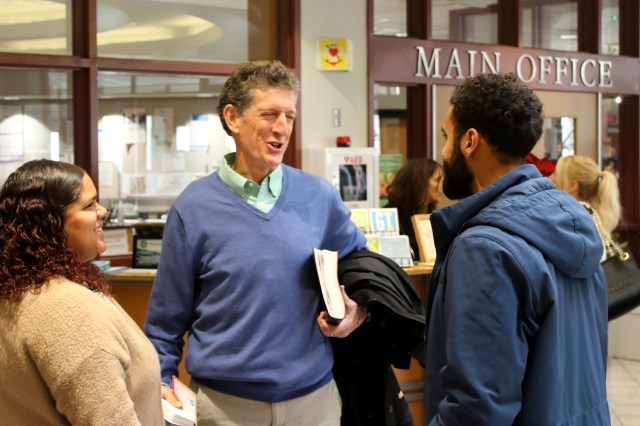 Photo by James Thompson
Photo by James ThompsonThe first time I spoke to Cliffe, I had called his office hoping to schedule an interview. He picked up while I was leaving a message. We exchanged pleasantries for a few moments, and then I suggested we arrange a time for a longer conversation on Zoom.
A pause.
“I’m sorry, brother,” Cliffe said with a hint of embarrassment before explaining that he wasn’t sure he could use the video-conference platform without help. Would I mind just calling his landline instead?
This seems as good a time as any to mention that starting a social media ministry was not Cliffe’s idea. A couple Give Me An Answer board members encouraged Stuart Knechtle, Cliffe’s middle son, who joined the ministry in 2015, to try repurposing content from TV for newer platforms.
Stuart did not have accounts on TikTok or Instagram, and he was unconvinced that the open-air dialogues would find an audience there. Wasn’t TikTok for teenagers with selfie sticks?
“I thought it was silly,” Stuart told CT. Eventually, some contacts sent him studies on how other ministries had grown because of TikTok, and he thought, “All right, let’s give this thing a chance.”
He began posting reels on TikTok in 2020. They showed a few seconds of Cliffe talking or debating with someone on a campus, captioned with an attention-grabbing quote from their discussion.
Most of the videos fell flat, but occasionally one would gain traction—often clips of Cliffe debating broader cultural issues. Stuart used this insight to begin building a following.
“I tried to have this balance of, okay, here’s where we’re really going to get incredible engagement,” Stuart recalled. “And it’s not overtly gospel. But now in the next post, I’m going to [use a clip focusing on] the gospel so that big audience that you just drew, that’s anti-Christian even, is going to hear the gospel.”
The ministry’s social media accounts grew over several years. They now have over 2 million followers on both TikTok and Instagram (both accounts are under Stuart’s name) and over 880,000 subscribers on YouTube.
Stuart remembers breaking a million followers on TikTok as a turning point. Fan accounts began remixing and reposting their content, making clips into memes or editing them with dramatic music in the background. This helped widen their reach even further.
When I interviewed Cliffe last year, there was still a bit of disbelief in his voice when he talked about the scope of the ministry’s internet presence. He referred to TikTok as a “godless, secular social media platform” but said that “to be able to present the gospel in that environment is just such a privilege.”
TikTok has changed the Knechtles’ reception on campus. Cliffe used to have to wait for crowds to form—once, at Rutgers University, he started preaching to his wife because no one was stopping to listen—and sometimes large gatherings turned against him, even spitting or throwing things at him. One of Stuart’s earliest memories is of Cliffe speaking to an especially antagonistic crowd at the University of California, Berkeley.
Now, crowds gather before they arrive. On many campuses, especially at universities in the Bible Belt, the questions overwhelmingly come from Christians who have seen the duo online.
Cliffe said he’s grateful for the chance to speak to so many students, but there are challenges to this new reality too. All the positive attention creates an environment where it’s harder to have dialogues with non-Christians.
“If you have a [large group of] students out there and the vast majority of them are followers of Christ, it is not cool to step out and really lambaste me, and I miss that,” Cliffe said. “Those are the folks I want to talk to.”
For viewers who have watched Cliffe having a fiery exchange with an agnostic undergrad and thought maybe he should dial it back a bit, so has he. On occasion, debates with students have devolved into shouting matches, and Cliffe admits that at times he’s gotten “too upset, too angry,” and “too intense.” He has felt the Holy Spirit convict him of this, in some cases directly after an exchange with a student, and apologized.
“I’ve had to work hard on growing in patience, and that’s been very, very helpful for me to grow in that area,” he said.
But he is also convinced that he should give the most robust apologetic of the gospel that he can, even when that means stepping on some toes.
This conviction grew stronger after a conversation years ago with Steve Brown, a Presbyterian minister and author. At an InterVarsity beach-evangelism project in Fort Lauderdale, Cliffe wondered aloud if sometimes it might be better to lose a debate with the long-term goal of not turning the person off from the gospel. Brown immediately rejected this idea.
“Steve looked at me and said, ‘Don’t you ever lose an argument,’” Cliffe remembered. “‘You make sure that you communicate the truth as clearly as you can.’”
It’s a lesson that Cliffe has passed on to his son. Stuart, in addition to being an assistant pastor at Grace, is also a therapist. In his first open-air dialogue with Cliffe after joining his ministry, Stuart took a laid-back, clinical approach in their conversations with students.
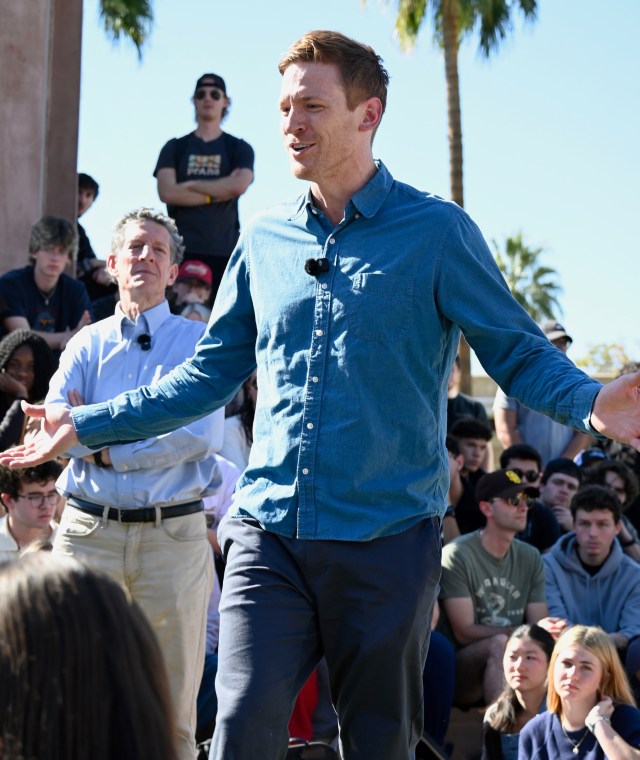 Photo Courtesy of Give Me An Answer
Photo Courtesy of Give Me An AnswerStuart remembers feeling “a little bit defeated” at the end of the day, as not many people had stopped to talk with them and the exchanges they did have hadn’t seemed very productive. Afterward, Cliffe offered some encouragement—and then some feedback: Open-air evangelism is not the time for a “large-group counseling session.”
“I don’t think I’ve ever taken that approach again,” Stuart said. “I do a lot of one-on-one counseling, [but] that style and delivery doesn’t translate well. You still want to speak to the heart and love a person into the kingdom ultimately, but if your delivery and style is too PC, it’s just not going to be effective in that kind of environment.”
Clips from open-air debates are proliferating online, as many ministries and groups have recognized their power to attract viewers and engagement.
Sean McDowell, a professor of apologetics at Biola University and host of the Think Biblically podcast, said that people are drawn to the “inherent drama” of open-air dialogues, and that the format can often help a speaker reach a wider audience.
“Many people are invited to consider spiritual things who might not be on an active search,” McDowell said. “The downside is that many presenters are not able to engage as effectively as Cliffe and often come across as either angry or uninformed. Done well and wisely, I don’t think there’s any considerable downsides of having it as one important element of evangelism. It is one effective way to evangelize. And Cliffe and Stuart are the best.”
The explosion of their digital ministry has netted Cliffe and Stuart invitations to appear in new venues, including some where evangelical pastors are not usually invited. In May 2024, they were on influencer Logan Paul’s Impaulsive podcast.
Paul’s show can be crass and would never be mistaken for a Focus on the Family program. For two-and-a-half hours, though, Paul and cohost Mike Majlak peppered the Knechtles with tough but friendly questions about their faith. The episode has 4.2 million views.
They received “a little bit of blowback” online, Cliffe said, from Christians who were concerned about them appearing with a controversial figure like Paul, but Cliffe believes most people understand why they want to be in “places where people desperately need the gospel.”
Much like on a college campus, his goal in settings like Paul’s podcast is “to listen to people, understand where they are, and then help them take the next step closer to Christ.”
There have been invitations to appear in more political spaces as well. Over the years, Cliffe has eschewed wading into that arena directly and often parries political questions with a line about how America is great when it follows Christ and ugly when it does not. He encourages Christians to vote and participate in politics but doesn’t publicly advocate for specific politicians or parties.
In December, he told CT that this approach reflects the priority of his ministry.
“I feel called to build bridges with people who don’t believe in Christ,” he said. “I do not want to unnecessarily alienate anybody. The cross of Christ is offensive enough as it is; the word sin is offensive enough as it is, as is judgment and hell. And we don’t back off from any of that.
“We also don’t back off from the ethical lessons that the Bible teaches us, and those are highly offensive as well. So I do not want to add the political differences to the conversation. Instead, I teach people to read the Bible, apply it to their lives, [and] think through all the different issues.”
To be sure, he doesn’t hesitate to articulate clear positions on hot-button topics like abortion and sexuality. Yet despite his aversion to supporting specific political parties or candidates, Cliffe has appeared at events hosted by Charlie Kirk, the conservative political activist and MAGA insider.
In some ways, this collaboration makes sense: Kirk is an evangelical Christian, and faith has seemed to take a more prominent role in his work in the past few years. Like Cliffe, he visits college campuses to take questions from students, and clips from these events rack up millions of views on social media.
But the two men offer different takes on how faith and politics should intersect. In conversations with college students, Cliffe is sometimes at pains to convey that following Jesus is not synonymous with a particular political party or persuasion. Kirk puts forward a starkly different view: that a true born-again Christian cannot vote for a Democrat.
Kirk has also pushed American pastors to directly endorse conservative candidates and has said that congregants should leave their churches if their pastors resist becoming explicitly political.
Cliffe noted that he and Stuart appeared with Kirk at a “Believer’s Summit,” not an event directly focused on politics. They have since joined him for another, similar gathering in February. Both events were organized by TPUSA Faith, a church-focused initiative of Kirk’s organization, Turning Point USA.
“If someone on the other side of the political aisle would invite me to [talk about faith], I would welcome that opportunity and would jump at it immediately,” Knechtle said. “But it was only Charlie Kirk that so far invited us. So I accepted, and we had a great time there.”
The young evangelicals who fill Liberty University’s Vines Center for Convocation gatherings usually give guest speakers a nice round of applause as they take the stage.
This past November, they stood for Cliffe. The ovation lasted almost 30 seconds. When it finally died down, several students in the audience called out at him, like lifelong fans finally seeing their favorite musician in concert.
He replied with a shy grin, a wave, and a thumbs-up, then launched into his talk: “How do you share your faith? How do you communicate Jesus Christ to people living in the secular culture that we live in today? Three points this morning …”
Why does Cliffe have such a passionate following among young, social media–savvy evangelicals? Getting him to reflect on his “success” or “influence” is a bit difficult, as he seems to automatically deflect recognition toward others: God, for giving his ministry opportunities to reach people in new ways; Stuart, for starting and managing their social media accounts; his church, for being so supportive. From his perspective, he’s just kept plodding in the same direction.
“I got a great compliment last week,” he said, chatting with me in the basement of his Connecticut home while his family gathered upstairs. “A guy said, ‘I’ve watched your old stuff. I listen to you today. You’re the same.’ So the point is, faithfulness is the barometer of success. The message does not change.”
Cliffe sees the process of a person deciding to put their faith in Christ as a “chain with many links.” The open-air conversations, he said, are often a first or middle link rather than the final one.
Through his many, many years of pre-TikTok ministry, he often didn’t get to see much visible fruit from his work (although sometimes he did). Now, hundreds of responses to their social media posts attest to how content from Give Me An Answer has helped many trust in Christ for the first time.
He mentioned the importance of faithfulness several times during our conversation, and I asked if this focus on remaining faithful to his calling is what kept him motivated during more discouraging times in his career.
“Yes, but that’s no different than today,” he said with sudden intensity. “Now I just have to figure out how I can put the best schedule together to get to the most non-Christians, and that’s exactly what I was asking 44 years ago and 20 years ago. So it really hasn’t changed that much.”

